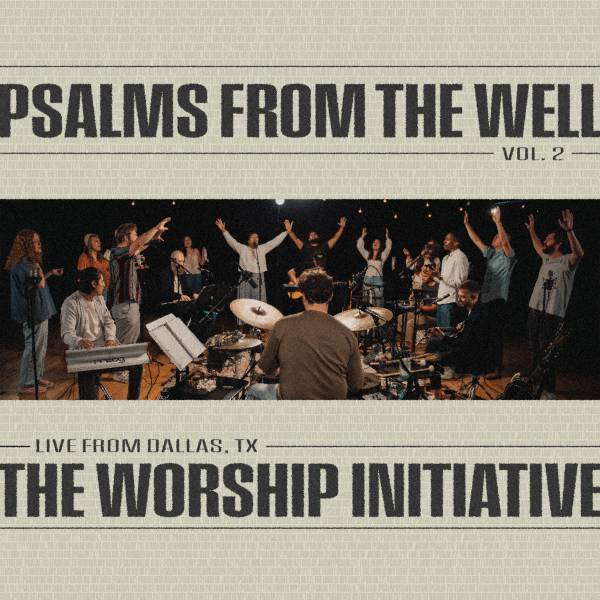The King Is In The Room Devotional
"The King is in the room, Lord we enthrone You upon our praise..."
There are moments in life when we need a reminder that Jesus is not distant or detached—He is here. Right now. In the room. In the midst of whatever battle you’re facing, whatever burden you’re carrying, whatever joy or sorrow is present in your heart—He is with you.
The song The King Is In The Room by Phil Wickham powerfully declares this truth. Jesus, our King, isn’t just seated on a heavenly throne; He is present and active in our lives. When He steps into a situation, transformation happens. Chains break. Hearts are made whole. Fear flees. Hope rises.
The King’s Presence Brings Freedom
The lyrics proclaim:
"Come see all the captives run free, He’s tearing down the walls..."
Throughout Scripture, when Jesus entered a room, things changed. The sick were healed (Mark 5:41-42), the lost were found (Luke 19:9-10), and even the dead were raised (John 11:43-44). The same Jesus who walked into homes, villages, and temples is the same Jesus who walks into your circumstances today. He has the power to set you free from sin, shame, and fear.
Is there an area in your life where you need His presence to break through? A stronghold that needs to fall? A heart that needs healing? He is not waiting for the perfect moment—He is already in the room, and His power is at work.
The King’s Presence Invites Our Surrender
"Jesus, we bow only to You, we're laying down all of our crowns."
When we acknowledge His presence, our response is worship and surrender. Just as the wise men laid their gifts before Jesus at His birth (Matthew 2:11), we are called to lay down our crowns—our pride, our fears, our control—and enthrone Him as King over our lives.
Are you holding onto something that needs to be surrendered? A burden, a dream, a fear? Lay it before Jesus today. The King is already in the room, ready to take it and replace it with peace and freedom.
Prepare the Way
"I can't wait to see what He's gonna do, ev'ry mountain has to move."
The song ends with a powerful charge: Prepare the way! Just as John the Baptist called people to prepare for Jesus’ ministry (Mark 1:3), we are invited to make room in our hearts, churches, and lives for His power to move.
Are you expectant for what God is going to do? Are you preparing your heart to receive His presence? No matter where you are today, take a moment to welcome Him in.
Prayer:
Jesus, I acknowledge that You are here. You are not far away, but near, active, and moving in my life. I lay down my fears, my pride, my burdens, and my plans before You. Have Your way in me. Tear down walls, break chains, and make me new. I prepare the way for You to move, and I worship You as my King. Amen.
Reflection Questions:
- Where do you need Jesus to bring freedom in your life?
- What “crown” do you need to lay down before Him today?
- How can you prepare the way for the King’s presence in your daily life?
Let’s live with expectancy—the King is in the room.
Last Updated: April 10, 2025
More Lists
 I Know A Name Devotional
I Know A Name DevotionalThere is power in a name. Some names evoke memories, others carry authority, but there is only one Name that has the power to silence storms, defeat death, and bring the dead to life—the Name of Jesus. Throughout Scripture, we see the incredible authority of Jesus' Name. When spoken, demons trembled (Luke 10:17), sickness vanished (Acts 3:6), and salvation became a reality (Acts 4:12). His Name is not just a title; it is a declaration of His character, His power, and His victory over sin and death. The Name That Breaks Chains In I Know A Name, we declare that when we call on Jesus, chains break and dry bones wake. This echoes Ezekiel 37, where God commands the prophet to speak to the valley of dry bones, and by His word, life is restored. The same is true for us today. Whatever feels lifeless—our faith, our joy, our hope—can come back to life in Jesus' Name. Are there areas in your life where you feel bound or dry? Call on His Name. Philippians 2:9-11 reminds us that God has given Jesus the Name above every name, and at His Name, every knee will bow. That includes every fear, every struggle, and every stronghold. The Name That Shakes Hell When we sing, "The gates of hell shake every time I call Your Name," we are reminded of Jesus' promise in Matthew 16:18—"I will build My church, and the gates of hell shall not prevail against it." The enemy has no power over a believer who stands firm in Jesus' Name. Whatever battle you face, know this: the darkness trembles when you speak His Name in faith. The Name That Brings Resurrection The bridge of the song proclaims, "Dead things come alive in the Name of Jesus." This isn't just poetic language—it's the heartbeat of the Gospel. Jesus didn't just defeat death for Himself; He did it for us. When He called Lazarus from the grave (John 11:43), life returned. And today, He is still calling dead things back to life—dreams, relationships, faith, and even our very souls. Call on His Name Today No matter where you are, no matter what you face, there is power when you call on Jesus. If you need healing, call Him your Healer. If you need freedom, call Him your Deliverer. If you need strength, call Him your Sustainer. The Name of Jesus isn't just something we say—it's who He is. He is alive, reigning in power, and when we speak His Name in faith, something shifts in the spiritual realm. Today, take a moment to call on His Name. Whisper it in worship. Declare it in confidence. Shout it in victory. And watch as chains break, dry bones wake, and the very gates of hell shake in response. Prayer Jesus, Your Name is above every name. When I call on You, I know You hear me. Today, I bring You every burden, every fear, and every dead thing in my life, and I declare that You have the power to bring life and freedom. Strengthen my faith to trust in Your Name, and let me walk in the authority and victory that is mine through You. In Jesus' Name, Amen.
 What An Awesome God Devotional
What An Awesome God DevotionalSometimes a song doesn't just speak truth—it shakes it loose in our hearts. Phil Wickham's rendition of What An Awesome God breathes new life into Rich Mullins' timeless anthem. With a fresh blend of reverence and testimony, this version walks us through the awe-inspiring majesty of God's nature and His unstoppable love for us in Christ. 1. The Majesty of His Might "Fire in His eyes, healing in His veins / Everywhere His glory on display." Look up at the stars tonight. Every one of them burns under the sovereign gaze of a Creator who knows them by name (Isaiah 40:26). The same God who speaks galaxies into existence also walks into broken hospital rooms and brings healing. He commands the wind and waves and still knows the number of hairs on your head (Matthew 10:30). That's not distant power. That's personal majesty. 2. The Mercy in His Movement "Even when I ran, He didn't run away / He came and put death back in its place." Our awesome God is not only strong—He is good. He didn't stay in heaven while we wandered. He came down. Took the cross. Broke the curse. And on Sunday, He rose. The scars in His hands and feet aren't reminders of defeat—they're declarations of victory. Because of Jesus, shame no longer has the last word. The grave doesn't hold the final note. Hallelujah! 3. The Hope of His Return "Eyes on the sky, there will be a day / He will come and wipe our tears away." This world is not the end of the story. The aches of this life will one day dissolve in the light of Christ's return. No more fear. No more pain. He is coming again—not with a sword to condemn but with hands to restore. Until then, we live in anticipation, lifting our voices with saints and angels: “You are worthy!” Worship ResponseLet this song not just be something we sing—let it be how we live. In awe. In gratitude. In surrender. Whether you're facing something overwhelming today or feeling the weight of the ordinary, remember this: You serve a God who reigns with wisdom, power, and love. And that is more than enough. PrayerLord, You are an awesome God. Thank You for Your glory, Your grace, and Your promises. Help me to live in awe of You today—not just in song, but in every word, decision, and step. May my life be a chorus that never stops proclaiming Your greatness. Amen.
 Here Is Love, Vast As The Ocean (Everlasting Praise) Devotional
Here Is Love, Vast As The Ocean (Everlasting Praise) DevotionalScripture Focus:"But God demonstrates His own love for us in this: While we were still sinners, Christ died for us." — Romans 5:8 When we think about love, we often imagine something grand, but even the greatest human love cannot compare to the love of God. The song Here Is Love Vast As The Ocean beautifully captures the boundless, unrelenting love of Christ—a love that cannot be measured, contained, or exhausted. The opening verse describes God's love as vast as the ocean and His kindness as a flood. These images remind us that God's love is not a trickle or a stream—it is an overwhelming, endless expanse. Like the ocean, His love reaches beyond what we can see or comprehend. It engulfs us, carries us, and sustains us. The Cross: Love Poured OutThe second verse draws us to the mount of crucifixion, where Jesus shed His precious blood. The song uses the imagery of floodgates of mercy bursting open, unleashing a vast and gracious tide. It is a reminder that the love of Christ is not just affectionate; it is costly. He poured out His life so that we, a guilty world, could be reconciled to God. Grace and justice, two things that seem at odds, met in perfect unity at the cross. The Resurrection: Love UnrestrainedBut love did not end at the cross. Verse three takes us to the resurrection morning, where mercy filled the thirsty grave. The stone rolled away, not just to let Jesus out, but to let us in—to new life, to restored hope, to a love that will never die. His victory over death assures us that no sorrow, no sin, no suffering can ever outrun His joy. The resurrection proves that His love is not just enduring—it is victorious. An Invitation to Drink and LiveIn the final verse, we are invited to come and drink and live. Jesus offers Himself as the source of living water (John 7:37-38). His love is not just something to admire—it is something to receive. For a weary world longing for meaning, for hope, for something eternal, what more could He give? He has already given everything. Responding to Everlasting LoveAs the song closes with the refrain, Now to Christ who fully loved us… be everlasting praise to Him, our hearts should be filled with gratitude and awe. The only proper response to such love is worship—unceasing, unending praise to the One who freed us from sin. Reflection Questions: Have you ever felt overwhelmed by God's love like an ocean? What was that experience like? How does the image of grace and love like mighty rivers change the way you see Jesus' sacrifice? Do you find it difficult to believe that God's love is greater than your failures? What Scripture reminds you of His unrelenting grace? How can you respond to this vast love today—with worship, with obedience, with surrender? Prayer: Heavenly Father, I stand in awe of Your love—a love so vast, so deep, so unrelenting. Thank You for Jesus, for the cross, for the mercy that flowed like a river to rescue me. Help me to rest in this love, to trust in its power, and to respond with a heart full of praise. Let my life reflect the greatness of Your love, and may I never cease to sing Your praise. In Jesus' name, Amen.
 Christus Victor (Amen) Devotional
Christus Victor (Amen) DevotionalChristus Victor: Understanding Christ's Ultimate Victory In the rich tapestry of Christian theology, few concepts capture the majesty and power of Christ's work as profoundly as Christus Victor - "Christ the Victor." This ancient understanding of Christ's redemptive work, which gained prominence in the early church through theologians like Irenaeus and Augustine, presents Jesus not merely as a sacrificial lamb, but as the triumphant king who has overcome every power that stands against God's people. The phrase "Christus Victor" emerged from the early church's meditation on passages like Colossians 2:15, which declares Christ as "disarming the powers and authorities, making a public spectacle of them, triumphing over them by the cross." This victory motif runs deep through Scripture, from God's deliverance of Israel through the Red Sea (Exodus 14:13-14) to Christ's resurrection breaking the power of death itself (1 Corinthians 15:54-57). O Most High King of the ages Great I AM, God of wonders By the blood You have redeemed us Led us through mighty waters In this powerful anthem, the Getty team, along with Matt Boswell, Matt Papa, and Bryan Fowler, have crafted a declaration of Christ's supreme victory that echoes through the ages. The opening proclamation draws directly from biblical titles of God (Psalm 47:2, Exodus 3:14) and sets the stage for a song that will traverse the full scope of Christ's victorius work. The first verse connects Christ's redemptive work to the Exodus narrative, pointing to Christ as our "strength our song our sure salvation" - echoing Moses' song of deliverance in Exodus 15:2. Now to the Lamb upon the throne Be blessing honor glory power For the battle You have won Hallelujah, Amen The second verse brings us to the incarnation, addressing Christ as "Son of Man" - Jesus' favorite self-designation (appearing 88 times in the Gospels) - and "sent for sinners" (1 Timothy 1:15). The progression "Who lived who died who rose victorious" presents the gospel in its most concise form, reflecting Paul's summary in 1 Corinthians 15:3-4. The chorus's response draws directly from the worship scenes in Revelation 5:13. With every tribe and every tongue We join the anthem of the angels In the triumph of the Son Hallelujah, Amen The inclusion of "every tribe and every tongue" reflects the universal scope of Christ's victory, prophesied in Daniel 7:14 and celebrated in Revelation 7:9. This victory belongs not just to one people or time, but to all who trust in Christ throughout history. The final verse looks forward to Christ's return, where He appears as "King of the nations, Robed in praise crowned with splendor." This imagery draws from Revelation 19:16, where Christ returns as "KING OF KINGS AND LORD OF LORDS." O Most High King of the nations Robed in praise, crowned with splendor On that day who will not tremble When You stand Christ the Victor Who was and is and is forever The bridge's threefold "Amen" mirrors the pattern of heavenly worship in Revelation 19:4, where the twenty-four elders and four living creatures fall down in worship, saying "Amen, Hallelujah!" The song concludes with the triumphant call to "Sing the victory of the Lamb," joining the eternal song of heaven described in Revelation 15:3-4. Sing the victory of the LambHallelujah Amen Amen In a world that often feels chaotic and threatening, this song reminds us that Christ's victory is not just a future hope but a present reality. Through His victory, we find strength for today's battles, comfort in our struggles, and confidence in our witness. As Isaiah 25:8 prophesied and 1 Corinthians 15:54 confirmed, "Death has been swallowed up in victory." May this anthem strengthen our faith in Christ's complete victory and embolden us to live as those who share in His triumph, until that day when every knee bows and every tongue confesses that Jesus Christ is Lord, to the glory of God the Father (Philippians 2:11). For as the song declares, He truly is the one "Who was and is and is forever" - the victorious Christ who reigns eternal.
 Bless God Devotional
Bless God DevotionalScripture:"Bless the Lord, O my soul, and all that is within me, bless His holy name!" – Psalm 103:1 (ESV) A Call to Bless God in Every Season The song Bless God, arranged by Travis Cottrell, is an anthem of worship and surrender, calling us to bless the Lord in every season of life. It echoes the heart of Psalm 103, where David reminds his soul to praise God—not based on circumstances, but because God is always worthy. The lyrics speak of blessing God in the sanctuary and the fields of plenty but also in the darkest valleys and when our hands are empty. This is the essence of true worship—praising God not just in abundance but in the waiting, the struggling, and even in suffering. Blessed Are Those Who Trust in Him The first verse reminds us of the promise that those who run to Jesus, seek His face, and fix their gaze on Him will not be shaken. In a world that constantly shifts, this assurance is an anchor for our souls. When we choose to fix our hope on Jesus, we are choosing stability, security, and peace that surpasses understanding. "Blessed are those who seek His face, who bend their knee and fix their gaze on Jesus, they won't be shaken." Have you placed your hope in Christ today? If the storms of life are shaking you, take a moment to re-center your focus on Him. He is your firm foundation. A Pilgrim's Heart The second verse calls us to walk with God on the journey of faith, setting our hearts on pilgrimage. To be a follower of Jesus means to embrace a journey—not always easy, but always leading us to His glory. "Blessed are those who walk with Him, whose hearts are set on pilgrimage, with Jesus, they'll see His glory." What does it look like to live as a pilgrim today? It means daily surrender, choosing obedience, and walking by faith rather than sight. When we give our lives fully to Jesus, we find the greatest joy in living for Him alone. Worship as a Sacrifice The bridge of Bless God challenges us to worship even when it costs us something: "Bless God when my hands are empty, bless God with a praise that costs me." There are moments in life when worship doesn't come easily—when our hearts are heavy, our prayers seem unanswered, and the weight of trials presses down. Yet, it is in these moments that our worship becomes a sacrifice, an offering of trust. Job, after losing everything, still declared: “The Lord gave, and the Lord has taken away; blessed be the name of the Lord” (Job 1:21). That kind of worship changes us. It realigns our perspective and reminds us that our faith is not built on what God does for us but on who He is. Every Chance I Get The repeating tag, "Every chance I get, I bless Your name," is a powerful reminder that worship is not confined to a Sunday service or a moment of music—it's a lifestyle. We are called to bless God with our words, our actions, our work, and our obedience. Today, take a moment to bless the Lord. Not just in your comfort, but in your struggle. Not just in your victories, but in your waiting. Lift your voice, lift your hands, and declare that He is worthy—every chance you get. Reflection Questions: Where in your life do you need to shift your focus back to Jesus so that you will not be shaken? What does it mean for you to have a "pilgrim's heart" in your walk with Christ? How can you worship God today, even if it costs you something? What is one way you can make blessing God a daily habit, not just a moment in church? Prayer:Lord, I bless Your name today—not just in the good times but in every season. Teach my heart to trust You fully, to seek You earnestly, and to praise You unconditionally. Whether in abundance or need, joy or sorrow, I choose to worship You. Every chance I get, I will bless Your name. Amen.
 Take Heart Devotional
Take Heart DevotionalScripture:"I have told you these things, so that in me you may have peace. In this world you will have trouble. But take heart! I have overcome the world." — John 16:33 Confidence in the Chaos Life is full of battles. Some are external—challenges at work, broken relationships, financial struggles. Others are internal—anxiety, doubt, grief. In the face of these trials, fear often takes hold, whispering that we are alone and powerless. But Take Heart by The Worship Initiative reminds us of a greater reality: we are never alone. Even when an army surrounds us, even when the battle feels overwhelming, "The Lord is my light and my salvation—whom shall I fear?" (Psalm 27:1). God is our stronghold, and He is not shaken. Because of this, we can stand firm, confident that He is with us. A Soul That Sings in the Storm The chorus is a declaration:"Take heart, my soul, be strong. The light has overcome." This is not just wishful thinking—it is a promise grounded in Christ. Jesus Himself told His disciples that in this world, trouble is inevitable. Yet He followed that sobering truth with a call to courage: "Take heart! I have overcome the world." (John 16:33). Notice that Jesus doesn't say, "You will overcome," as if our strength is enough. No—He says, "I have overcome." Our confidence is not in ourselves, but in the One who has already won the victory. When storms rage around us, we don't have to panic. We don't have to run. We can sing. The Greatest Desire Verse 3 echoes the heart of David in Psalm 27:4:"One thing I ask of the Lord, this is what I seek: to dwell in the house of the Lord all the days of my life." When trials come, it's easy to pray for immediate relief—to ask God to remove the struggle. But David's prayer, and the heart of this song, remind us that our deepest need is not the absence of trouble, but the presence of God. More than resolution, we need relationship. More than a quick fix, we need Him. When our hearts long for His presence above all else, we will find strength that the world cannot shake. A Call to Courage The bridge is an anthem: "Take heart, my soul. Be strong." This is both an encouragement and a challenge. Strength is not just something we receive—it is something we step into. It is a choice to trust. A choice to worship. A choice to stand firm when fear tells us to fall back. When the waves crash, take heart.When the night feels long, take heart.When hope seems distant, take heart.Because our Savior reigns. And the light has overcome. Reflection Questions: What battles are you facing right now? How does knowing God is your stronghold change the way you approach them? Do you find yourself asking for relief more than relationship? How can you shift your prayers to seek God's presence above all else? What does it look like for you to “take heart” in this season of your life? Prayer: Father, You are my light, my stronghold, my salvation. In the middle of the battles I face, remind me that You have already overcome. Strengthen my heart when fear tries to take hold. Teach me to long for You more than I long for answers. May my soul find its confidence not in my own strength, but in Your unshakable presence. I will sing in the storm because I know You are with me. Amen.
 He'll Do It Again Devotional
He'll Do It Again DevotionalExodus 14:14“The Lord will fight for you, and you have only to be silent.” (ESV) Every once in a while, I come across a verse in the Bible, especially in the Old Testament, where I stop and wonder how I've managed to glaze over some incredible truth way too many times. Exodus 14:14 is a great example of this for me. The Israelites have just left Egypt. Finally set free! Under the leadership of Moses,they leave their slavery and start heading for the Promised Land. We're all, familiar with the story - Pharaoh changes his mind (again) and goes out to recapture his slave workforce. The Israelites start to, uh, …panic. And I can't say that I blame them. Looking ahead at a large impassible body of water and behind at the “whole Egyptian army” (vs 9) that was about to overtake them would cause fear in the most reasonable of people. The Israelites were no exception. The Lord, however, had a different plan. One that His people couldn't see. After some complaining to the Lord (vs 10-12), Moses finally answers with this great (albeit difficult-in-the-moment) truth. 13 And Moses said to the people, “Fear not, stand firm, and see the salvation of the Lord, which he will work for you today. For the Egyptians whom you see today, you shall never see again. 14 The Lord will fight for you, and you have only to be silent.” Another translation says it this way: 14 “You will not have to do anything but stay calm. The Lord will do the fighting for you.” (ERV) Eugene Peterson paraphrases it a little more straightforward in The Message: 14 “God will fight the battle for you. And you? You keep your mouths shut!”We of course know the rest of the story and thousands of years later we're still talking about the power of God parting the Red Sea. A few things stick out to me about this verse: 1) God had led them to that exact place. It wasn't an accident that they were in a bit of a bind.2) God was very aware of the situation at hand.3) God had a plan for His people, His beloved. Even if it wasn't a miraculous parting of the water, God was, and is, sovereign over every situation.4) God was going to do the work. The people were instructed to “keep their mouths shut.” We find ourselves regularly in situations that are difficult. Sometimes it's of our own doing. Sometimes it's just part of life. Paul says in II Cor 4 that, among other things, we are “hard pressed on every side” (vs 8 NIV) and yet not crushed. Life is full of challenges that allow us to grow in our trust and dependence on a holy, loving God that is able to do exceedingly and abundantly more than all we could ask or imagine. We aren't promised that the sea will part before us or that our suffering will suddenly and miraculously end. Heb 11 reminds us that heaven is full of saints that “didn't receive the promise” yet still held on to their faith (vs 39-40). But we are promised that we serve and know a God that loves us and has everything under His control. Maybe our challenge today is to wait for God to fight for us and “be silent” or “stay calm” or as Eugene says, “…keep your mouths shut.” That's challenging for all of us.
 Christ Be Magnified Devotional
Christ Be Magnified DevotionalThe journey of faith is a continuous ebb and flow of drawing nearer to God, of letting our own desires and ambitions fade as the brilliance of Christ shines brighter within us. In the profound worship anthem Christ Be Magnified by Cody Carnes, we hear a heartfelt cry for the exaltation of Jesus in our lives, a desire that mirrors John the Baptist's declaration in John 3:30. The song begins with an earnest plea, *"Were creation suddenly articulate with a thousand tongues to lift one cry, then from north to south and east to west, we'd hear 'Christ be magnified!'”* These powerful words set the stage for a narrative that underscores the importance of Christ's preeminence in all things. John the Baptist, the forerunner of Jesus, embodied this sentiment. Though he had a significant ministry, drawing people from all over to the message of repentance, John always retained sight of his primary purpose: to point people to Christ. When his disciples felt a tinge of jealousy because Jesus was drawing bigger crowds, John's response was clear and humble: "He must increase, but I must decrease." How can we embrace this same posture in our daily lives, allowing Christ to be magnified in every situation? 1. Surrender Daily: Each day offers new challenges and new opportunities. By starting our day with a prayer of surrender, we signal to God our willingness to let Him lead. "Christ be magnified" is not just a phrase; it's a daily commitment. 2. Embrace Humility: John's willingness to play second fiddle to Jesus is a powerful lesson in humility. Recognizing that all gifts, talents, and opportunities come from God helps us use them to point others to Him rather than drawing attention to ourselves. 3. Seek His Glory, Not Yours: In every accomplishment, every praise, and every platform, our primary aim should be the glorification of Christ. As the chorus of the song resounds, *"Oh, Christ be magnified! Let His praise arise! Christ be magnified in me,”* let that be our genuine prayer in every season. The bridge of Christ Be Magnified offers a beautiful surrender: *"I won't bow to idols, I'll stand strong and worship You. And if it puts me in the fire, I'll rejoice because You're there too."* This mirrors the sentiment of Shadrach, Meshach, and Abednego, who refused to bow to King Nebuchadnezzar's golden image, confident that God was with them even in the fiery furnace. Being a Christian doesn't mean we'll escape challenges. In fact, there might be situations where standing up for Christ puts us in difficult positions. However, like the heroes of faith before us, our resolve should remain unshaken. For when we stand with Christ, we are in the best company. Today, as you hum or sing Christ Be Magnified, take a moment to introspect. Are there areas in your life where you've been increasing and Christ has been decreasing? It's never too late to realign. Let's allow this song to become the anthem of our hearts, a continuous prayer that in every moment, every situation, and every season, Christ would be magnified.John 3:30 - "He must increase, but I must decrease."
 Who You Say I Am Devotional
Who You Say I Am DevotionalIn the mosaic of life, where diverse experiences, voices, and circumstances often shape our self-perception, it's essential to anchor our identity in an unchanging truth. The song Who You Say I Am by Brooke Ligertwood powerfully redirects our focus from external labels to the eternal words of our Creator. "Who am I that the highest King Would welcome me? I was lost but He brought me in Oh His love for me Oh His love for me! Who the Son sets free Oh is free indeed I'm a child of God Yes I am!" These poignant lyrics encapsulate a journey from feeling lost and unworthy to a profound realization of divine love and acceptance. They mirror the transformative truth found in our key scripture from John: in Christ, we are truly free. Reflecting on "Who You Say I Am" and John 8:36, several foundational truths come to light: 1. Freedom in Christ: One of the song's core declarations aligns perfectly with our key scripture: "Who the Son sets free, Oh is free indeed." This freedom is multi-dimensional. It's freedom from sin, from the bondage of past mistakes, from societal labels, and from the weight of others' expectations. In Christ, we are free to be who we were created to be. 2. Identity as God's Child: The world may assign numerous labels to us, some flattering and others not. Yet, the most significant identity we can hold is that of being a child of God. The song's chorus emphatically states, "I am who You say I am." This understanding roots us in love, grace, and purpose, ensuring that we're not swayed by fleeting definitions of worth. 3. The Depth of Divine Love: The lyrics ponder, "Who am I that the highest King Would welcome me?" It's a reflection shared by many in scriptures, like King David in Psalms. This marveling at God's love underscores the depth and breadth of His affection for us. Despite our imperfections and irrespective of our past, we are welcomed, cherished, and loved by the Creator of the universe. Today, as the melodies and messages of "Who You Say I Am" resonate in your heart, consider the voices and labels that have tried to define you. Are they in alignment with God's words about you? Remember, the world's definitions are often transient and shallow, but God's words about you are eternal and profound. If you've felt chained by past mistakes, societal expectations, or feelings of inadequacy, let today be a turning point. Embrace the freedom that Christ offers. Recognize and relish your identity as God's beloved child. Bask in the profound love He has for you, knowing that you're not defined by worldly measures but by divine declarations. In moments of doubt, let the words of "Who You Say I Am" echo as a reminder in your heart. And with every beat, may your soul grow more anchored in the unchanging truth of your identity in Christ, leading you to live with confidence, purpose, and unwavering joy.John 8:36 - "So if the Son sets you free, you will be free indeed."
 Praise You Anywhere Devotional
Praise You Anywhere DevotionalI'll Praise You … On The Mountain "Praise God from whom all blessings flow." "The Praise and Worship Band will be coming up to lead us." "Praise The Father, Praise The Son." We often talk about praising God. In fact, we often use the word “praise” in Christian circles. But what does that truly mean? And what does that truly look like? A quick Google search will show you that there are at least eight documented words for “praise." Hallah, Yadah, Barak, Tehillah, Zamar, Todah, and Hallelujah. Each has a different connotation – some religious and some not – but each carries a special weight. And if there are eight words for praise, that means that there must be at least eight ways to praise, right? Yadah is worshiping with extended hands. Barak is denoting blessing, often seen at the beginning of a prayer. Tehillah is to sing a song of praise. So, how do we know what it looks like to truly praise the Lord? Let alone, praise Him anywhere? We look to His scriptures and the ways that we have been taught to praise God! Today, we will focus on praising God from the mountaintop, when everything is good and well with our souls. In Luke 17, we get to read about a miraculous event that took place when Jesus healed 10 men of leprosy. Our Savior was on His way back to Jerusalem when 10 men called out to Him, asking for pity: “They stood at a distance and called out in a loud voice, 'Jesus, Master, have pity on us.'" (Luke 17:12) Now, if someone had leprosy during that time and it had gone away, they would have to go to a priest to be examined and pronounced “clean” before they could re-enter society. So, this is what Jesus commanded them to do. They went in faith before even experiencing healing, and then, on their way, they were fully cleansed. What a wonderful miracle, right? Yes! But the story doesn't stop there. Verse 15 tells us, “One of them, when he saw he was healed, came back, praising God in a loud voice. He threw himself at Jesus' feet and thanked him - and he was a Samaritan.” (Luke 17:5) Samaritans were hated by Jews during that time because they regarded them as “half-breeds. They were seen as lesser than, and all around dirty. In fact, most Jews would never even step foot in Samaria (hence the scandal of Jesus talking to the Samaritan woman). But, as we know now, Jesus came for all His children. And, as our Savior will point out in this story, this Samaritan was the only one to return to praise God. He recognized the power of Jesus and wanted to praise the God from whom it came from. So He did, and Jesus blessed him saying, “Rise and go; your faith has made you well,” (Luke 17:19). What a declaration! The word for praise in this particular chapter is doxazó, meaning to bestow glory upon. It's a beautiful word showing the beauty of the Samaritan's worship. But he was only one of 10. The truth is, oftentimes we can be a lot more like the nine who never came back to praise Jesus than the one who did. We don't do it on purpose, but sometimes when we experience a blessing or a miracle, we are so enthralled in it that we forget to lift our eyes to the One who gave it to us. However, let this be a challenge to each of us not to forget about God on the mountaintop. After all, He guided us there. He walked with us there. And He probably even carried us to the top of it. Take a moment to listen to “Praise You Anywhere” by Brandon Lake and reflect: Is there a mountaintop or blessing that you have forgotten to praise God for? If so, take the time to praise Him now. Based on the song Praise You Anywhere by Brandon Lake. Original post by Essential Music available on YouVersion.
 Praise You Anywhere...In The Valley Devotional
Praise You Anywhere...In The Valley DevotionalI'll Praise You … In The Valley As we jump into day two of learning to praise God anywhere, we find ourselves on the opposite side of the mountain: deep in the valley. We all learned about valleys fairly early in life, probably in a science/history/geography type class. In between two mountains is a valley, a low area where the sky is darker and the nights are colder. And then there's the metaphorical valley, where the nights are full of shadows and darkness. We feel doubt, we feel alone, and we feel fatigued. It's hard to see God, let alone praise Him, when we are in a valley. However, Psalm 42 can be our road map in times of deep struggle and stress. The writer of Psalm 42 (called the “sons of Korah”) holds the key to praising God in a valley, and it starts with deep honesty. “My tears have been my food day and night, while people say to me all day long, 'Where is your God?'... Why my soul are you downcast? Why so disturbed within me?” (Psalm 42:3, 5) In the valley, your tears can feel like the only things you feel, that sting of saltwater on your cheeks. In the valley, God feels like a question mark. Where is He? Is He real? In the valley, your soul feels weak and heavy. You feel ruined. You feel tired. You feel disturbed by the sin and pain of the world. If you have felt these things or if you are feeling them now, please know that you are not alone. The author of Psalm 42 has felt them. Psalm 42, however, then takes a unique shift. In the midst of depression and deep grief, the Psalmist turns to praise and remembrance. In fact, verse 5 alone shows a sweet juxtaposition of grief and praise, “Why, my soul, are you downcast? Why so disturbed within me? Put your hope in God, for I will yet praise him, my Savior and my God,” (Psalm 42:5). For I will yet praise Him – what a POWERFUL piece of scripture! The Psalmist recognizes that he will not immediately feel better. Praise may not lift him out of the valley. But, he will turn his eyes to God and what He's done before. Praising Him for the past, present, and what He would do next. The word used for praise here is yadah, one that we discussed on day one. It's a type of praise in which one is casting out worship, with their hands extended. There is surrender embedded in this type of praise, and that's what we need in the valley. That's how we find the strength to praise God anyway and anywhere, despite our circumstances. It's turning our eyes to Him – recognizing His love and compassion for us, despite the valley that may surround us. Just like God was carrying us to the mountaintop, He also is holding us in the valleys. Verse 6 brings us another note for praising God in the valley: remembrance. “My soul is downcast within me; therefore I will remember you…” (Psalm 42:6). When we turn our eyes from the valley to God Himself and all He's done before, we can praise Him for the mountains of the past, even while in the valley. He is faithful and He will continue to be faithful, always. Take a moment to listen to “Praise You Anywhere” by Brandon Lake and reflect: Where are you experiencing a valley in life right now? Where does it feel hardest to praise God? Remember one thing where God showed up, and take a moment to thank Him for that moment. Based on the song Praise You Anywhere by Brandon Lake. Original post by Essential Music available on YouVersion.
 Praise You Anywhere...In The Ordinary Devotional
Praise You Anywhere...In The Ordinary DevotionalI'll Praise You … In The Ordinary We've taken the time to learn about praising God in the mountains and in the valleys, but what about the in-between? In the song “Praise You Anywhere,” Brandon Lake sings: “Sometimes you've gotta welcome the wonder, wait for the answer, worship with your hands in the air.” And sometimes, we find ourselves just waiting. We walk through the days with a mundane feeling - nothing is bad but nothing is great either. And yet, God calls us to praise Him anywhere with faithfulness. You may know the story of Stephen, the first martyr in the Church, who was stoned to death for his faith in God (found in Acts 7). This was a courageous act of faith, one that we can all look up to. However, if we flip back to Acts 6, we can see the background of who Stephen really was - and His ordinary praise towards God. Acts 6 included a conversation between the 12 apostles who were struck with the problem of widows being overlooked in the daily distribution of food. To remedy this, the 12 decided to choose seven men to whom they would delegate the task of food distribution. “Brothers and sisters, choose seven men from among you who are known to be full of the Spirit and wisdom” (Acts 6:3). And one of these men was Stephen. He was a faithful man, full of the Holy Spirit and the Spirit's wisdom, which is why he was chosen for the task. Yet the task was a small one. It wasn't a valley task, after all. He was chosen for something, but it certainly wasn't a mountain task. Even the 12 mentioned the difference between their ministry of the word of God to the idea of waiting tables (Acts 6:2), meaning that the mission of God should not be stopped by the struggle of administration. Yet, Stephen was deemed worthy of the responsibility of taking care of the widows in his community and he did it with praise. In fact, the reason Stephen was then seized by the Sanhedrin came down to the fullness of God's grace and power that was upon him. He glorified God well, even in the ordinary. And Stephen used his ordinary days to serve God faithfully, thus preparing him to be chosen by God for a deep sacrifice. More than often, our days won't be spent in a valley or on a mountaintop. Instead, we'll have to praise God faithfully in the mundane. And sometimes, praising God looks like serving His people well. After all, He loves His Creation (so much so that He sent His Son for us), and we can glorify Him well in spaces of service. Take a moment to listen to “Praise You Anywhere” by Brandon Lake and reflect: What is something that you do every day? How can you bring God into that simple act or habit? How can you currently be faithful with what you have right now? Take a moment to breathe in and out. You are cared for by the heavenly Father, and He enjoys every moment you spend praising Him. Based on the song Praise You Anywhere by Brandon Lake. Original post by Essential Music available on YouVersion.

